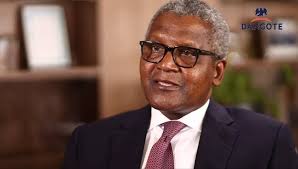President of Dangote Group, Aliko Dangote, has raised alarm over challenges facing his $20 billion Dangote Refinery, including difficulty accessing crude oil from Nigerian producers, leading the facility to import about 10 million barrels of crude oil monthly from countries like the United States.
Dangote made this known in Abuja on Tuesday during the “NMDPRA/S&P Global Commodity Insights Conference on the West African Refined Fuel Market.” He called on the Nigerian Midstream and Downstream Petroleum Regulatory Authority (NMDPRA) to revoke or penalise holders of dormant refinery licences across the country.
According to him, many licence holders have failed to build refineries, which is counterproductive to Nigeria’s goals of achieving refining self-sufficiency.
“I believe anybody who collected these licenses from you, either you cancel them or you put a penalty on a yearly basis so that they will return the license or they will build those refineries,” Dangote stated.
He urged the NMDPRA and the government to intensify efforts to encourage more refinery investments, stating that the nation’s refining sector needs strong regulatory action to move forward.
Dangote also decried the lack of harmonised fuel specifications across African countries, noting that fuel produced for Nigeria cannot be sold in neighbouring countries like Cameroon, Ghana, or Togo, even though they use similar vehicles.
“Unlike Europe, which has adopted harmonised fuel specifications, Africa remains fragmented,” he said, explaining that this fragmentation only benefits international fuel traders who take advantage of pricing differences and arbitrage.
He criticised the dumping of cheap and often substandard petroleum products into African markets, especially from Russian sources. These low-priced imports, according to him, are undercutting locally refined fuel and creating unfair competition for refineries like his.
“In Nigeria, due to this unfair competition, the price is just about 60 cents per litre, even cheaper than in Saudi Arabia, which produces and refines its own oil,” he lamented.
Dangote urged African governments to emulate the United States, Canada, and the European Union by taking concrete steps to protect domestic refiners from toxic imports and unfair global pricing mechanisms.
He revealed that the Dangote Refinery will soon undergo an Initial Public Offering (IPO), which would allow ordinary Nigerians to own shares in the 650,000 barrels per day facility, described as the largest single-train refinery in the world.
Despite these challenges, Dangote noted that Nigeria is now a net exporter of refined petroleum products. He said the refinery has exported around one million tonnes of Premium Motor Spirit (PMS) — also known as petrol — in the past 50 days.
On access to crude, he expressed frustration that the refinery could not easily purchase Nigerian crude directly. Instead, he said the company often has to buy through international oil traders at steep premiums.
“Rather than buying crude oil directly from the Nigerian producers at competitive terms, we found ourselves having to negotiate with international trading companies who were buying Nigerian crude and reselling it to us with hefty premiums,” he said.
According to him, the refinery currently imports between 9 and 10 million barrels of crude monthly, mostly from the U.S. and other foreign suppliers. He acknowledged that the Nigerian National Petroleum Company (NNPC) has been supportive by supplying some cargoes, but International Oil Companies (IOCs), he said, have been the most uncooperative.
Beyond crude supply, he highlighted the excessive port and regulatory charges faced by the refinery, which account for about 40 percent of total freight costs. This, he said, makes it more expensive to move crude from within Nigeria than for Indian refiners importing from distant regions.
He cited an example: “A boat to New York costs just about $400 from London. But to go to Accra from Lome, you pay $600. That’s how bad things are.”
Dangote also noted that lifting schedules are often delayed by upstream operators, further compounding the refinery’s logistical and financial pressures.
He decried the current system where domestic cargoes from the Dangote Refinery are charged at both loading and discharge points, while competitors importing from Lome pay only at the discharge port.
“This is simply unfair and it is unsustainable,” he warned.
